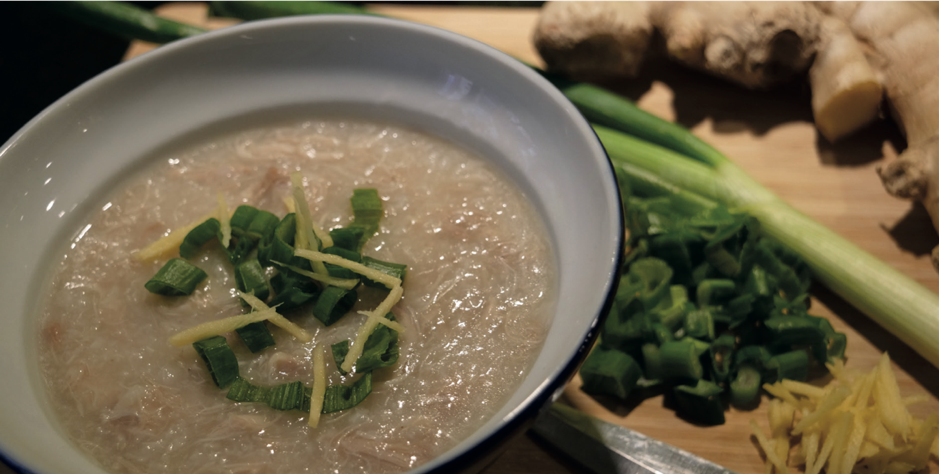In Malaysia, possibly most of Asia and many other parts of the world, food is more than just eating to get energy. It is culture, identity, a socially-binding force, the joy of life...the list of descriptions goes on and on. People in Malaysia talk, cook, eat, breathe and live food. Food is boiled, steamed, braised, stir-fried in a wok, deep-fried, baked in clay...you name it, it gets done. I was exposed to this creativity in cooking early on in life and I too enjoy cooking, as well as eating. But I had never thought of cooking as digestion. What a revelation! But it makes sense! Take rice for instance, if you just took raw grains of rice into your mouth and chewed it, it would be hard and arduous, probably crack your teeth, before you could even swallow a few grains. Would it even taste good and could our digestive system even be able to break it down for energy?
The process of cooking is not just a hobby, it is an essential part of life as a human being in order to survive. It goes even further when you look at the theories that have been suggested over the past few years. One such hypothesis was proposed by biological anthropologist and primatologist Dr.Richard Wrangham. He suggests that the human brain evolved to its current size as we began cooking our food. As heating/ cooking what we ate, whether meat, grains or tubers, breaks-down starches, denatures protein and helps kill pathogen, the human body began having more energy to develop other body parts, such as the brain. Through this evolution came other changes in human development and social structure. Crazy to think that something so normal and under- appreciated as cooking could have such an impact on a whole life species and also the whole of the living world since our brain development led us to create a more complex style of living. I watched a documentary on the evolution of the digestive system. Part of Dr. Wrangham's research is featured at the end of the documentary.
One of the trends that we have at the moment is the Smoothie/ Juicing trend. I hear and read of many who swear by these methods of obtaining nutrients. As with many things in life, what fits some may not fit others. In Chinese Medicine, we have the view that some individuals tend to have heat in their system and others cold; these individuals who tend to heat may benefit from smoothie/ juice drinking, as most fruit and vegetables that have not been cooked have a cooling nature. From the Chinese medical nutrition perspective, this time of year requires us to eat warm food; one aspect is to have food in a certain temperature that our bodies do not have to expand more energy to warm the food further in order to digest and another aspect is that we receive warmth that will help our bodies stay at the ideal temperature of ca. 37 degrees Celsius. This is not to say that we do not eat any fresh vegetables and fruit, but that our food should be predominately warm and then supplemented by raw produce in winter. This will change as the season changes and the temperature warms up. If we look at the nature surrounding us right now in Switzerland, we will notice that there are little to no fruits growing on trees. They have all been harvested before the end of autumn. What fruit we have that are still fresh here, such as apples and pears, are harvested and stored in special conditions to last through winter. Tropical fruits or citrus fruits that we get from the supermarket are imported from places that are still having warm/ temperate climates currently. Therefore, it is best to eat these sparingly, like 1 to 2 fruits a day. Too many will cool our systems down too much and we will either feel cold often or be unable to digest the fruit well, leading to loose stools or diarrhoea.
One of the most beloved food for the Chinese is Congee, Bái Zhōu in Mandarin, Jūk in Cantonese or just simply rice porridge. It's rice cooked in a lot of water over a longer period of time. When I was ill as a child, this was the food my mother cooked for me, as I do for my children. But we cook a hardier version with meat in regular life in winter. It is easy to digest, yet very nutritious, providing enough fluids and nutrients. I have fasted on just water and plain Congee over a span of a week, and felt that I could actually perform everyday activities, including working, without feeling drained. It is simple, wholesome and easy to incorporate into your diet, even and especially if you are not used to cooking regularly but want to begin. Be creative, use the classical recipe as a base and then modify the ingredients to create your own personal Congee. Try it and start enjoying the warming nourishment!
Congee Recipe as pdf in English
Image Chicken Congee by Maria & Elaine


 RSS Feed
RSS Feed